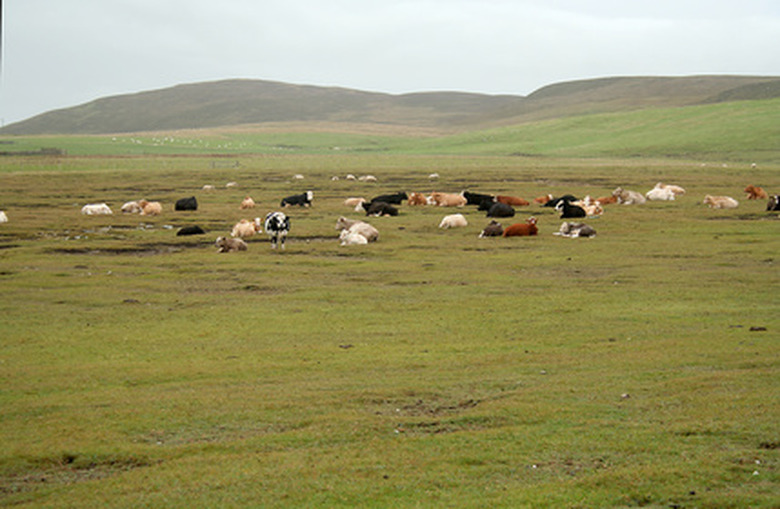Problems Of Liquid Cow Manure
A great way to give your plants, bushes and lawn extra nitrogen is to use liquid cow manure, sometimes called cow manure tea if it is homemade. Commercially manufactured liquid cow manure that is homogenized (heated) and has had the smell removed is readily available at lawn and garden centers. Or, like many gardeners choose to do, you can "brew" your own manure tea. Either way, liquid cow manure has advantages when used as a fertilizer for your plants, but can also be problematic.
Dangers of Overuse
Applying liquid cow manure to your plants can kill them by burning if the mixture is too strong or you apply it too often. Whether you use commercially manufactured or homemade liquid cow manure fertilizer, both are in concentrated form and you must dilute it before using it on your plants. Carefully follow the instructions on the label if you are using commercial products. For your homemade manure tea, dilute the brewed mixture in the ratio of one part manure tea to four parts water. Applying liquid cow manure to your plants too often may have your plants producing more green foliage than fruit or vegetables. Liquid cow manure consists of pure nitrogen, lacking the phosphorus and potassium that a balanced fertilizer contains. Too much nitrogen fed to your plants, without the adding phosphorus and potassium, will promote only green growth. Application should be once every week to two weeks for above-ground produce and only once a growing season for root vegetables.
- A great way to give your plants, bushes and lawn extra nitrogen is to use liquid cow manure, sometimes called cow manure tea if it is homemade.
Health Issues
Harmful bacteria, such as E.coli, can be found in cow manure, so it is critical that you take the precautions necessary to avoid or eliminate the possibility of infecting your produce with these bacterias. Commercially processed liquid cow manure does not have this problem since it is homogenized, a process which kills all bacteria. If you are making your own manure tea, use only old or aged cow manure for your cow manure tea. Aged or old manure usually has lost most of the harmful bacteria like E. coli. As an added precaution, locate your "tea" in a place, like a sunny spot on concrete, where it can heat up as it steeps. Heat kills E. coli and other harmful bacteria.
Lack of Microbes
Pre-made liquid cow manure fertilizer is convenient but it lacks the in additional nutrients that homemade manure "tea" has because commercial liquid cow manure has been homogenized, or heated, which kills any microbes and decreases the trace minerals in the manure. Microbes are the micro-organisms promote earthworm activity in your soil surrounding your plants, help fight disease-causing fungi in your soil and help maintain your plant's health.
- Harmful bacteria, such as E.coli, can be found in cow manure, so it is critical that you take the precautions necessary to avoid or eliminate the possibility of infecting your produce with these bacterias.
- Pre-made liquid cow manure fertilizer is convenient but it lacks the in additional nutrients that homemade manure "tea" has because commercial liquid cow manure has been homogenized, or heated, which kills any microbes and decreases the trace minerals in the manure.
